
Articles by Ethiopia
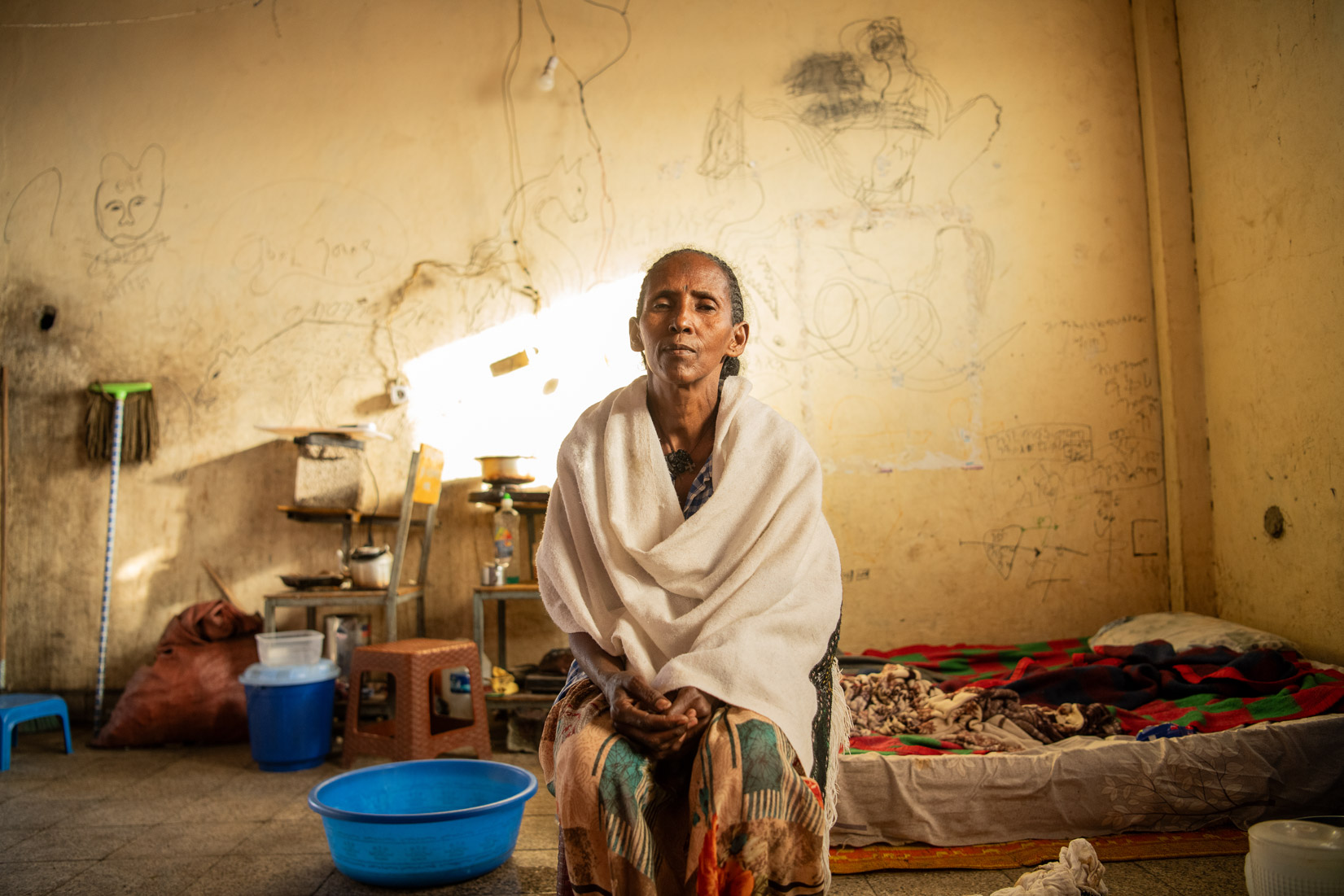
“Supporting each other is what makes women powerful."
In Tigray, Ethiopia, this vast secondary school once echoed with the sounds of students shuffling between classes and teachers giving lessons. Now it has been transformed into a crowded camp, sheltering more than 10,000 internally displaced people – most of them women and children. The rooms are divided up by large sheets to house multiple families. When night falls, they share thin mats and try to get some sleep. For two years, between November 2002 and November 2004, Tigray was in conflict, cut off from adequate food, medicine, and outside aid. Schools, hospitals, and essential services collapsed, shattering communities that once thrived on agriculture and trade. For International Women’s Day we collaborated with Ethiopian photographer Maheder Haileselassie to help tell the stories of women attending clinics and sheltering in displacement camps like this with their families. After fleeing the Tigray conflict and enduring immense hardship they continue to push forward with determination. Today and every day – despite devastating cuts to international aid – we are united in solidarity with them. Zenebu (above left) lived in her home town for more than forty years before fleeing four years ago: "We used to be wealthy. We owned cows, donkeys, and farmed several hectares. Militias stormed the town one day after midnight, and we had to flee empty-handed to save our lives. We want to go back home because there’s nothing to do here. The food and the sleeping situation are horrible, and I now have high blood pressure. I’m a very hardworking woman. My husband passed away more than thirty years ago, and I was the ‘man’ of the house, raising my children. I was a strong woman back home." For Wubalech (above right), the meaning of home has been upended: "We used to farm up to five hectares of land and had cattle,” she says. “Milk and butter were abundant. We left our good life." The Tigray War Report estimates that more than 500,000 people were killed in the conflict between various armed groups. According to Tigray's interim regional administration, one million internally displaced people remain scattered across the region. Women bore the brunt of widespread sexual violence, and many became the sole providers at home after losing family members in the war. Without identification papers, securing employment remains nearly impossible. Tirhas, pictured above, fled with her mother and siblings after her father was killed in the conflict. She stopped her studies and now works part-time as a house helper to support her family: "I can't continue my studies because I have to support my family. I'm the only one who brings in income. But I’m strong because I'm the one supporting my family, I’m carrying all the burden. Supporting each other is what makes women powerful." Research across 52 out of 84 districts of Tigray showed that 43% of women in Tigray experienced some form of gender-based violence during the conflict, with 29.2% of young women (aged 15–24 years) affected by sexual violence (Fisseha G et al, 2003). The brutality of sexual and gender-based violence during the conflict has left deep physical and psychological wounds, with survivors struggling to access justice and medical care. Mehret* 42, pictured above, was displaced five years ago and her story contains a graphic description of sexual violence. Mehret arrived at the camp with five of her children. Her husband and one of her children died fighting in the war and her eight-year-old daughter was kidnapped. Mehret endured unimaginable sexual violence: fighting forces put nails and stones in her vagina. At night, in the school, Mehret sleeps beside her own mother. They borrow bed mats when the pain Mehret still experiences after the violence is too bad for her to lie on the floor. "Just staying alive and being able to stand up again despite what I endured makes me know that I am resilient… As a woman, I have the right to proper nutrition, better medication and justice to return to my homeland." Mehret, who is now attending a college course, has found reserves of resilience that no-one should have to, and she is not alone in doing so. Despite many hardships, women in Tigray continue to push forward with determination. In the overcrowded shelters, they lean on one another, preparing communal meals, sharing scarce supplies, and caring for children who have seen too much. Twenty-three-year-old Rahwa was displaced four years ago. Her father was killed, and she fled with her mother and sisters. She had been studying in college, but first the COVID-19 pandemic and then the war interrupted her education. She started working for a private company but couldn’t afford rent outside the camp and had to return. Now, she only works part-time: “Standing still is good enough. I go out and work. It may not be enough, but it’s enough to get us through the day. If a woman has a job, she can become stronger than anyone. We don’t have our documents to get hired here, and we also get sexual requests to get employed. That makes it difficult to reach a better place." Amid the fragile situation, the International Planned Parenthood Federation (IPPF), through its partners, worked to restore essential sexual and reproductive healthcare under the IPPF humanitarian SPRINT response funded by the Australian Government's Department of Foreign Affairs and Trade (DFAT). Their efforts include mobile clinics and community outreach, providing maternal care, contraception, and sexual violence care. Between the camps and rural areas, more than 45,000 displaced people received clinical care, counselling, and sexual and reproductive education. Throughout the response, 483 women safely delivered their babies, including Adey, 33 (pictured left), who delivered her baby the night before this photo was taken. When her contractions started, an ambulance was sent to her home, and she later gave birth at the clinic. The women of Tigray have shown extraordinary resilience. But resilience alone does not solve health emergencies, feed families, or heal trauma. When healthcare systems collapse and funding disappears, it is women who bear the greatest burden physically, emotionally, and economically. Just weeks after these stories were captured, USAID funding cuts forced the closure and scaling down of critical services supported by IPPF partners. Some supported outreach projects have been shut down, and critical services such as ultrasounds, once free, are now forced to carry fees many cannot afford in order to keep the service open. The health, education and training programs for young people were affected, staff lost their jobs, and women who had begun to rebuild their lives now face new obstacles in accessing care. Their stories are far from over. “The USAID cuts came with very little notice. The women and girls will suffer the most, as they now face impossible choices between accessing healthcare, feeding their families, or securing even the most basic necessities for survival. These cuts don’t just reduce services, they strip away hope and force women in Tigray into even more precarious situations.” Said Valerie Dourdin, Global Humanitarian Director, IPPF. As International Women’s Day comes and goes, the displaced women of Tigray will remain – still strong, still determined, and still in urgent need of consistent, meaningful support.
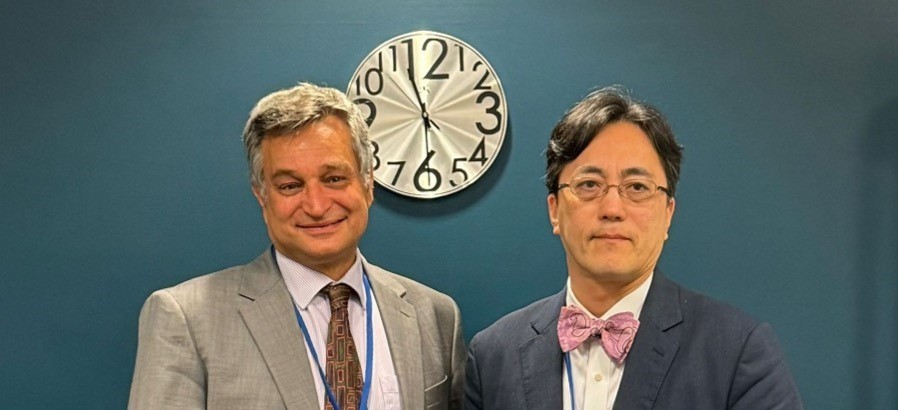
IPPF Director General and Japanese Ambassador Agree to Further Cooperation between Japan and IPPF
25 September 2024, New York - During his visit to New York to participate in the Future Summit and the UN General Assembly, IPPF Director General Dr Alvaro Bermejo held a side bilateral meeting with Mr Kazuhiko Nakamura, Director General and Assistant Minister for Global Issues, Ministry of Foreign Affairs of Japan to promote universal health coverage and women, peace and security. Dr Bermejo thanked the Government of Japan for the long-standing cooperation with and its consistent support since 1969. Dr Bermejo introduced IPPF and its Member Associations and Collaborative Partners operating in 152 countries, stating that in 2023, IPPF provided 22.4 million services to 71.4 million people worldwide. He further stated that in 2023, thanks to support from the Japanese Government's supplementary budget, IPPF was able to provide life-saving sexual and reproductive health and rights (SRHR) services to 291,723 people in crisis across four countries; namely Afghanistan, Ethiopia, Pakistan and Ukraine. He stressed that the IPPF and its Member Associations are playing an important role in the growing need for humanitarian assistance worldwide due to the effects of global climate change and increasing conflicts. He also confirmed that the IPPF is actively working on Women, Peace and Security (WPS) issues, which Japan attaches great importance to. Dr Bermejo also referred to the importance of Universal Health Coverage (UHC), Japan's leadership and notable pioneering initiatives and activities in this area. In response, Mr Kazuhiko Nakamura, Director General and Ambassador for Global Issues, stated that SRHR is a fundamental component of UHC and that progress in SRHR is essential to achieve UHC. Furthermore, these Mr Nakamura and Dr Bermejo agreed that Japan and the IPPF will further strengthen their cooperation, as it is impossible to fully realise UHC without addressing the SRH needs that the population has. In an increasingly polarised global situation regarding SRHR, Secretary-General Bermejo stressed the importance of balanced voices such as Japan as a bridge to facilitate dialogue in order to prevent global fragmentation. In particular, he noted the need for efforts to shift attention away from using SRHR as a political power struggle and towards the real issue of addressing ways and means to promote gender equality and health in particular.
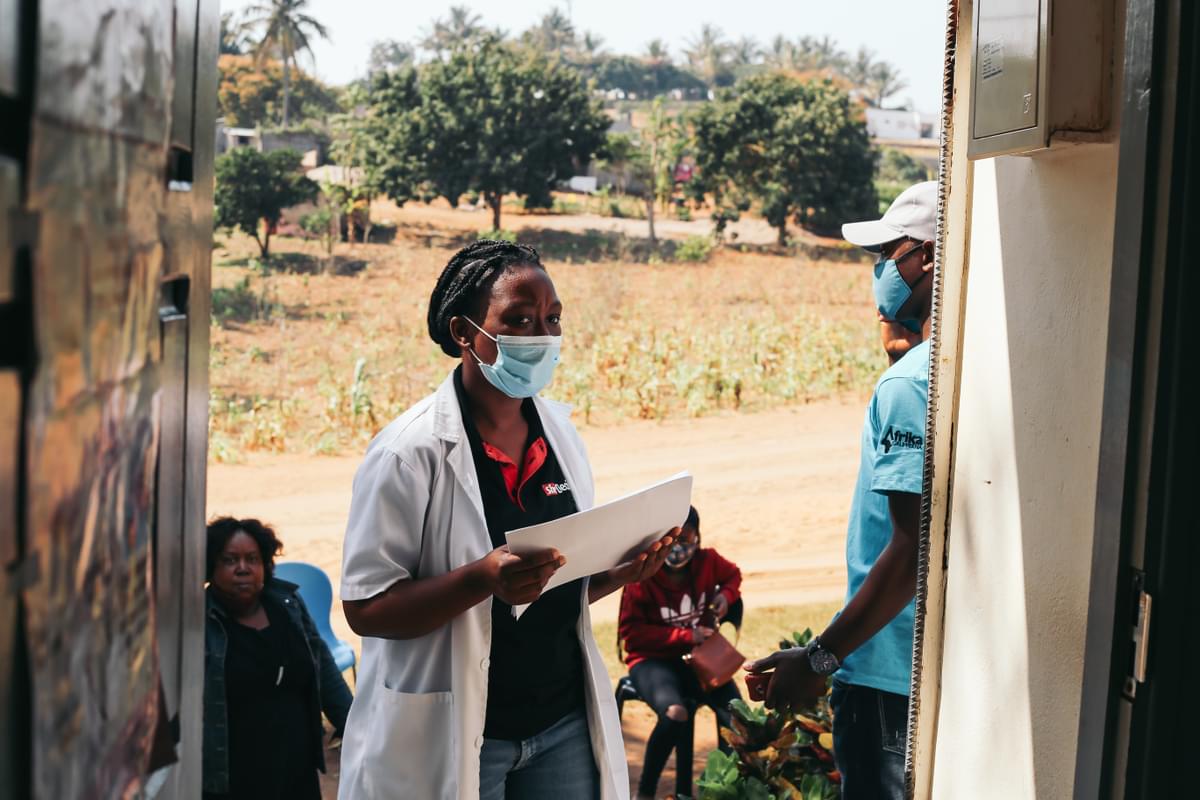
Major New Health Programme to Expand Sexual and Reproductive Health Services in East and Southern Africa
Nairobi, 23 September 2024 – A groundbreaking £75.125 million project has been announced by the International Planned Parenthood Federation (IPPF) and its partners, the International Rescue Committee (IRC), Options, Ipas, and Johns Hopkins University Centre for Communication Programmes, to transform sexual and reproductive health services across East and Southern Africa. This large-scale initiative will benefit seven countries, supporting millions of women, girls, and vulnerable communities in Burundi, Ethiopia, Madagascar, Somalia, South Sudan, Sudan, and Zambia. This programme, known as Women’s Integrated Sexual Health 2 (WISH 2) Lot 2, is funded by the UK Foreign, Commonwealth and Development Office (FCDO). As part of FCDO WISH Dividend, it builds on the successes of FCDO’s £272 million Women’s Integrated Sexual Health (2018-2024) programme, which spanned 27 countries across Africa and Asia. Over its lifespan, the first WISH programme supported over an estimated 16.9 million women and girls, helping them gain access to critical SRHR services. FCDO’s continued partnership with IPPF for this next phase of WISH was unveiled by FCDO's Chris Carter, on behalf of the UK Minister for Africa, Lord Collins, during the United Nations General Assembly (UNGA) side event, “SRHR: Securing reproductive choice for the next generation.” Announcing FCDO’s partnerships with IPPF, MSI Reproductive Choices and the Children's Investment Fund Foundation, Chris Carter noted the new programme will play a critical role in increasing women's voice, choice and control across 13 countries in Africa.” With the goal of delivering over seven million ‘couple years protection,’ the programme will address critical healthcare gaps, promote reproductive choice, and tackle harmful social norms. It will also provide urgent support to improve policies, strengthen health systems, and safeguard the reproductive rights of women and girls, especially in areas affected by conflict and displacement. At the heart of this initiative is a focus on reaching the most marginalised groups, including young women and girls under 20, those living in poverty, people with disabilities, and communities in conflict zones. Importantly, WISH2 will also work to improve access to safe abortion care and counteract the growing threats to women’s and girls' sexual and reproductive health rights. IPPF Director General Dr Alvaro Bermejo emphasised the critical need to protect and expand access to SRHR. “WISH2 will continue our mission of empowering women and girls across Africa to unlock their full potential. We will not only tackle the rollback of SRHR rights but also strengthen disability inclusion while delivering sustainable healthcare solutions,” said Dr Bermejo. “We’re grateful to the UK Government for their unwavering support in this important work.” Elshafie Mohamed Ali, Executive Director of Sudan Family Planning Association (SFPA) said “WISH2 is essential given Sudan’s current circumstances, particularly the ongoing conflict since April 15, 2023. The programme addresses the growing need for sexual and reproductive health services, offering crucial support to vulnerable communities amidst increasing instability and humanitarian challenges.” Chris Carter, Deputy Director, Head of Human Development Department, highlighted the impact of this new initiative: “Access to sexual and reproductive health services saves lives, empowers women and girls, and supports education, transforming lives and entire livelihoods. This project will amplify women’s voice, choice, and control across Africa, and we are proud to partner with IPPF and African organizations in this critical mission.” For media enquiries, please contact [email protected]

Government of Japan awards IPPF $2.08 million to support women and girls affected by conflict and natural disasters
With support from the FY2022 Supplementary Budget received from the Government of Japan, the International Planned Parenthood Federation (IPPF) Member Associations in four countries, namely Afghanistan, Ethiopia, Pakistan and Ukraine will protect the health and lives of vulnerable populations affected by conflict and natural disasters through the community-based provision of sexual and reproductive health and essential health services, including maternal and child health, in the following areas: Afghanistan: 9 provinces (Karpisa, Parvan, Badakhshan, Laghman, Logar, Bamiyan, Samangan, Baruch and Paktika) Ethiopia: 3 provinces (Afar, Amhara, Somali). Pakistan: 2 provinces (Balochistan, Khyber Pakhtunkhwa). Ukraine: 2 cities (Odessa, Poltava). In all countries the implementation of activities will be a participatory, inclusive and rights-based process that puts people at the centre, responding to their specific circumstances, challenges faced, needs and aspirations, while allowing the most vulnerable to have a voice. It also seeks to realise human security through the provision of relevant health services, especially for women, so that they can live with dignity and free from threats such as unwanted pregnancy, death of themselves and their newborns, and reproductive ill-health. By using and expanding local networks, knowledge, human resources and facilities developed through years of grassroots activities in each country, IPPF will expand the impact of our activities and cause lasting change in people's lives. The IPPF Director General, Dr Alvaro Bemejo, said, "I would like to express my sincere gratitude to the people of Japan for this invaluable support they have given to the IPPF. We will fully utilise this opportunity to deliver our services to as many vulnerable people as possible and will do our utmost to be there for them and support them." In the year to December 2023, IPPF, through our local partners, will aim to deliver health services and information to at least 270,000 people across the four countries. For further information, please contact Yuri Taniguchi of IPPF London at [email protected].
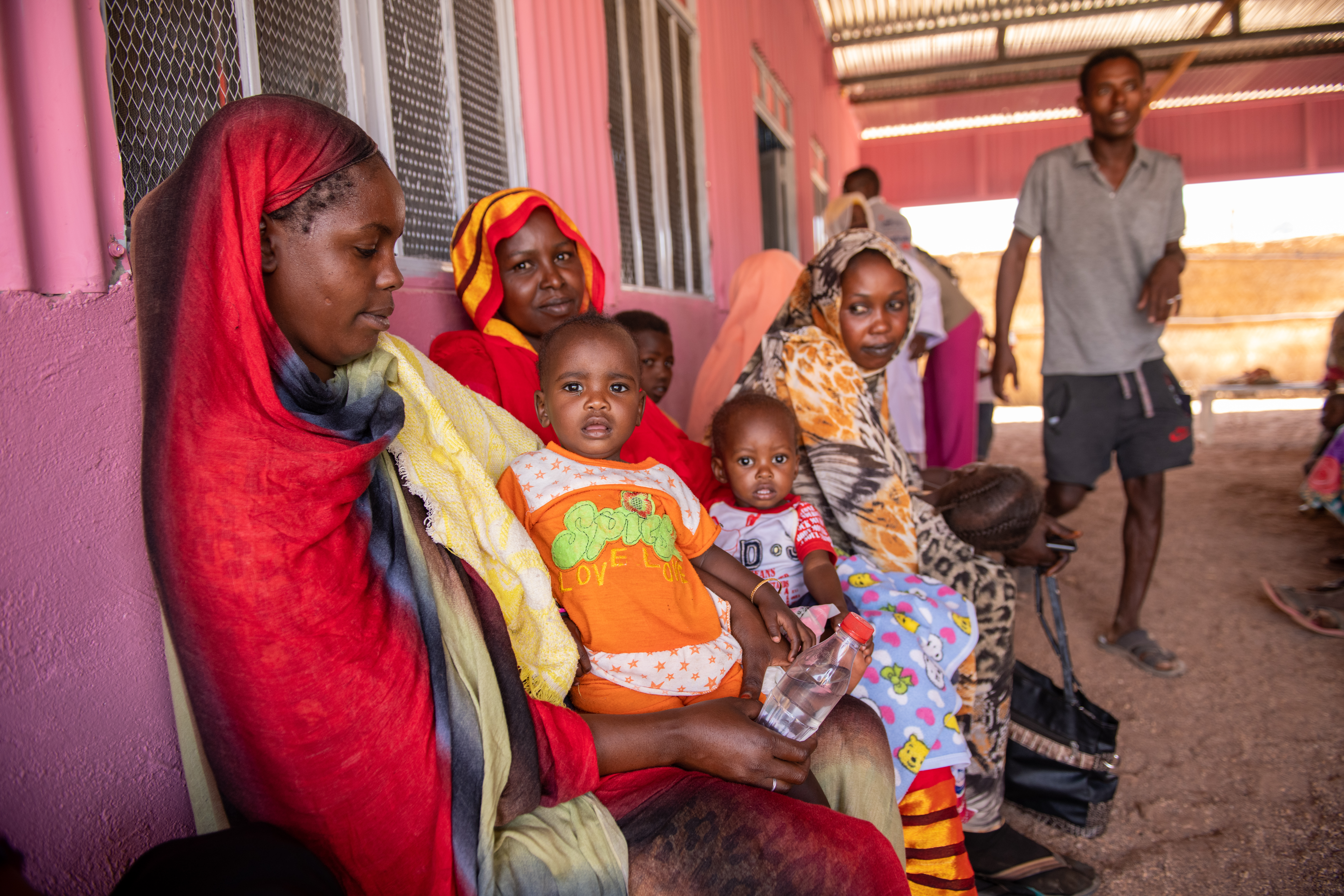
Ethiopian refugees find help in the clinic with pink walls
It's mid-morning, and the Um Rakuba refugee camp on the southern border of Sudan is hot. There are few trees to take shade from the 40°c heat. The dusty main road is bordered on both sides by rows upon rows of huts and tents, temporary accommodation established by The United Nations High Commissioner for Refugees (UNHCR) for the tens of thousands of refugees who have fled over the border from neighbouring Ethiopia since fighting broke out between government forces and the Tigray People’s Liberation Front (TPLF) in November 2020. The severe humanitarian crisis has left more than 5 million people facing starvation. This week, peace talks mediated by the African Union are taking place in South Africa in an aim to break the bitter impasse between the Tigray region and the Ethiopian federal governments and bring succour to the desperate people caught in the middle. Many arrivals tell of being victims of armed groups, facing perilous situations, including looting of their houses, forceful recruitment of men and boys and sexual violence against women and girls. Refugees are arriving with little more than the clothes on their backs, fatigued and in weak conditions after sometimes days of travel. The main road of the camp is peppered with the temporary offices of well-known charities, some providing food aid, others medical care. But there is only one clinic that has bright pink walls and welcomes women, girls, and men inside for free sexual and reproductive healthcare. The Sudan Family Planning Association (SFPA) quickly established a presence here once refugees started to arrive as they understood sexual and reproductive health is not only vital for women’s health and safety but very often overlooked by the humanitarian community.
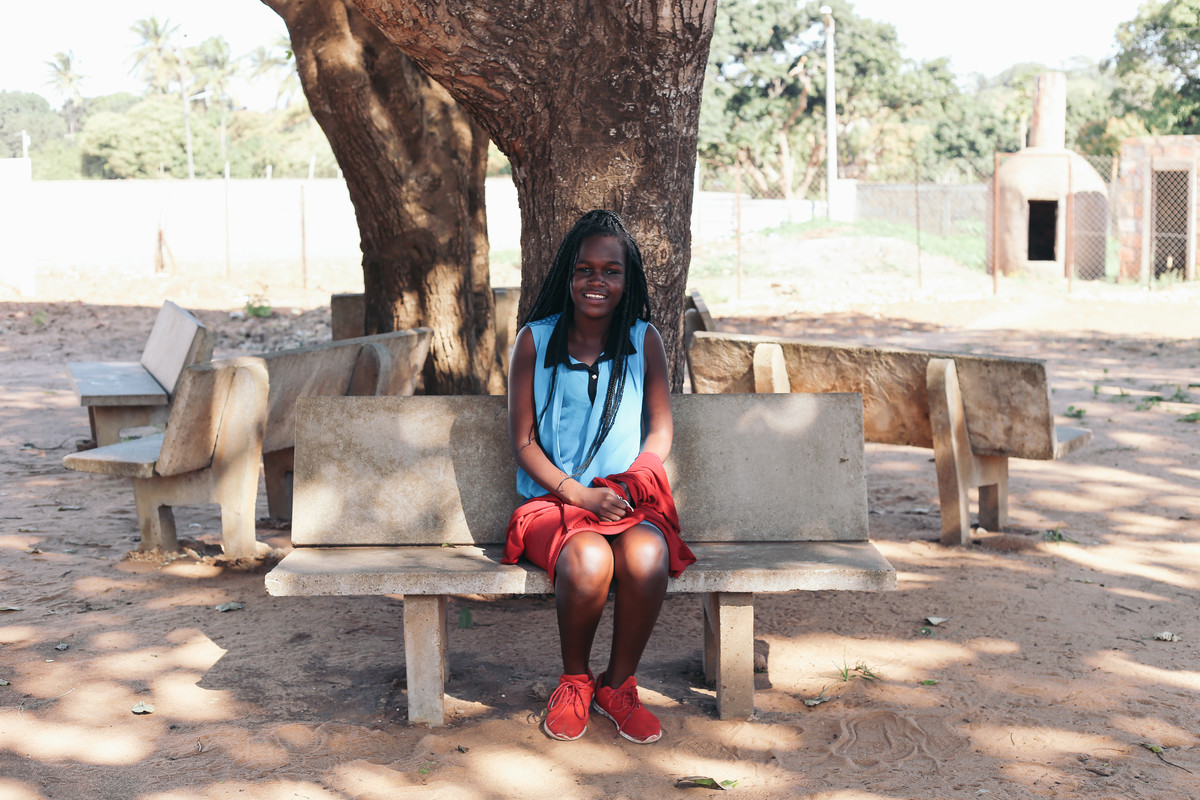
2020: An unprecedented year
There are some years that become a pivotal moment in history - 2020 is one of those. IPPF has never been faced with delivering healthcare in the grip of a global pandemic. Yet our global teams have demonstrated agility, resilience, and creativity putting clients at the heart of our work to ensure the safe delivery of vital care. The pandemic has changed how we work, but not what we do. Here we acknowledge some of our amazing colleagues, clients, and partners as well as events that have shaped 2020. Expanding healthcare for factory staff Sandra is one of a team of women who work at a cashew factory in a small town in rural Ghana. Thanks to a project run in partnership by Planned Parenthood Association Ghana (PPAG) and the Danish Family Planning Association (DFPA) women like Sandra can now access contraceptive and reproductive healthcare during their working day. "It has helped me a lot, without that information I would have given birth to many children.”© IPPF/Natalija Gormalova Share on Twitter Share on Facebook Share via WhatsApp Share via Email Ensuring healthcare provision during the pandemic Malak Dirani, a midwife at the Lebanese Association for Family Health (SALAMA). “My message to healthcare workers across the world is that we are always here for people to secure their health and rights. We are on the frontline; we were always the one who people trust! We are the nation's guiding light during this difficult time, so we can, with our efforts and power support patients, overcome this crisis, and save lives.”© SALAMA Share on Twitter Share on Facebook Share via WhatsApp Share via Email COVID-19 crisis sparks innovation New approaches to reach women with safe abortion care include telemedicine and home-based provision of medical abortion. To ensure that quality abortion care can be provided to women during travel restrictions, the Cameroon National Planning Association for Family Welfare (CAMNAFAW)’s service providers travel to partner clinics in underserved areas and to clients’ homes to provide medical and surgical abortion care. This model of taking safe abortion care closer to women will continue even with easing of travel restrictions, as this has been found to be an effective and acceptable approach to increasing access.© IPPF/Xaume Olleros Share on Twitter Share on Facebook Share via WhatsApp Share via Email Getting creative on social media A watercolour entry for a social media art competition. “With our Youth Network we created an artistic competition on our Facebook and Instagram platforms on issues such as masturbation, menstruation, coming out, female genitalia, pornography. The aim is to enhance creativity and make young people reflect about sexual and reproductive health and rights in a creative way during the pandemic. The aim was also to offer something fun and positive in this difficult time.” Noemi, 24, is the co-founder and coordinator of Santé Sexuelle Suisse/Sexuelle Gesundheit Schweiz's Youth Network. Share on Twitter Share on Facebook Share via WhatsApp Share via Email Delivering healthcare to remote communities in Fiji RFHAF Team in Kadavu performing general health checks after TC Harold. Healthcare provider, Nasi, administers an HPV shot to a client. In early April 2020, the all too familiar destruction of a Tropical Cyclone (TC) – Harold – hit the Solomon Islands, Vanuatu, Fiji and Tonga. One of the worst affected areas was the Eastern part of Fiji. Through support by Department of Foreign Affairs and Trade (DFAT), our Member Association, Reproductive and Family Health Association of Fiji (RFHAF), was quick to respond ensuring access to essential sexual and reproductive healthcare for Kadavu’s women, girls, and vulnerable groups.© IPPF/Rob Rickman Share on Twitter Share on Facebook Share via WhatsApp Share via Email Spotlight on women in leadership Executive Director, Dr Kalpana Apte, of FPA India talks about young people being a primary focus for access to healthcare and information. “Gender equality and equity is a fundamental issue that India must prioritize. India is a country of young people. That is the biggest cohort of people at this time in history. Within this group of young people, adolescent and young girls are the most marginalized group. The face of poverty in India is a young girl. Girls have fewer choices, options and opportunity. The gap between boys and girls in terms of access to sexual and reproductive health services and information is huge. Education, Health and empowerment are the three priorities for young girls.”© IPPF/Anurag Banerjee Share on Twitter Share on Facebook Share via WhatsApp Share via Email Humanitarian Youth Club, Kiribati Theta, 25, is part of the Humanitarian Youth Club set up by the Kiribati Family Health Association in her village. “I have helped the Humanitarian Youth Club to apply for financial grants from the Australian High Commission [for $1,000]. I am recognized as the smartest member who can write in English. We have learned how to design a disaster plan for the community and share our ideas on sexual and reproductive issues such as sexually transmitted infections. We discuss what we can do for the next strong tide, where we can gather as a community. For now, I want to enjoy the chance to be in our own beloved country. I won’t move until the majority have already left. I want my daughter to grow up in the same place I grew up in.”© IPPF/Hannah Maule-Ffinch Share on Twitter Share on Facebook Share via WhatsApp Share via Email Youth-led healthcare through song, dance, and poetry 17-year-old student Jumeya Mohammed Amin has been a ‘change agent’ for her community through the Family Guidance Association of Ethiopia since she was 14. "I wanted to protect girls from violence – like early marriage – and I wanted to change people’s wrong perceptions about sex and sexuality.”©IPPF/ Zacharias Abubeker Share on Twitter Share on Facebook Share via WhatsApp Share via Email Small but mighty: The Pill at 60 2020 marks the 60th anniversary of the game-changing contraceptive pill. For 60 years, “the Pill” has been approved for use in the US market, changing the face of reproductive control for millions of people since. Although taking a few years longer to become widely available to all women, the Pill was the first oral hormonal contraceptive. It allowed women to take real ownership over if and when they had children, and how many they had, giving them control over their lives in a way that had never been seen before.© Jessica Dance Share on Twitter Share on Facebook Share via WhatsApp Share via Email Being part of IPPF: What it means for Profamilia, Colombia Executive Director, Marta Royo. “For Profamilia, the value that the Federation adds is enormous. It gives us the possibility to exchange experiences and knowledge with other associations around the world, enriching our work, and allowing it to advance more quickly and with greater strength. This has allowed us to work with the most vulnerable populations in our country – from advocacy to healthcare service delivery, research, addressing issues as varied as abortion care, contraception and comprehensive sex education. Without this support, thousands of people in Colombia would not have access to any of these services.”© Profamilia Share on Twitter Share on Facebook Share via WhatsApp Share via Email Unprecedented support for women’s right to abortion care in Poland Huge numbers of people took part in protests prompted by the decision of the Constitutional Tribunal to impose a near ban on abortion on 22 October 2020. The ruling struck down the possibility for women to access abortion care on the ground of severe fetal impairment, rejecting what is the most common of the few legal grounds for abortion in the country at present. The demonstrations had a powerful impact, and on 3 November the government announced a delay in implementing its latest court ruling in response to the protests.© Marta Bogdanowicz Spacerowiczka Share on Twitter Share on Facebook Share via WhatsApp Share via Email US Election 2020 The people of the United States voted for change and progress. The reinstatement of the US Global Gag Rule in 2017 has had enormous consequences for women and girls accessing sexual and reproductive healthcare. IPPF calls on President-elect Biden to keep to his word of signing an executive order on his first day in office to repeal the harmful Global Gag Rule (the Mexico City Policy). © J. Smith/USA Share on Twitter Share on Facebook Share via WhatsApp Share via Email 16 Days of Activism Against GBV In humanitarian emergencies, women and girls may be forced to turn to survival sex work as a way of feeding themselves and their families. Without the usual healthcare available and low sexual health understanding, sex is frequently unprotected and violent, exposing them and their clients to sexually transmitted infections, including HIV. In fact, people who engage in sex work experience 10 times higher prevalence of HIV than the general population, with an average of a 12% rate of HIV infection.© Jem Milton Share on Twitter Share on Facebook Share via WhatsApp Share via Email Spotlight on sex and disability Joy & Jake talk sex and more to mark International Day of Persons with Disabilities. Joy and Jake – who are sight/visually-impaired – discuss the highs, lows, and everything in between of navigating sex, sexual health, dating, relationships and sex education, whilst living with a disability.© Bird Lime Media Share on Twitter Share on Facebook Share via WhatsApp Share via Email
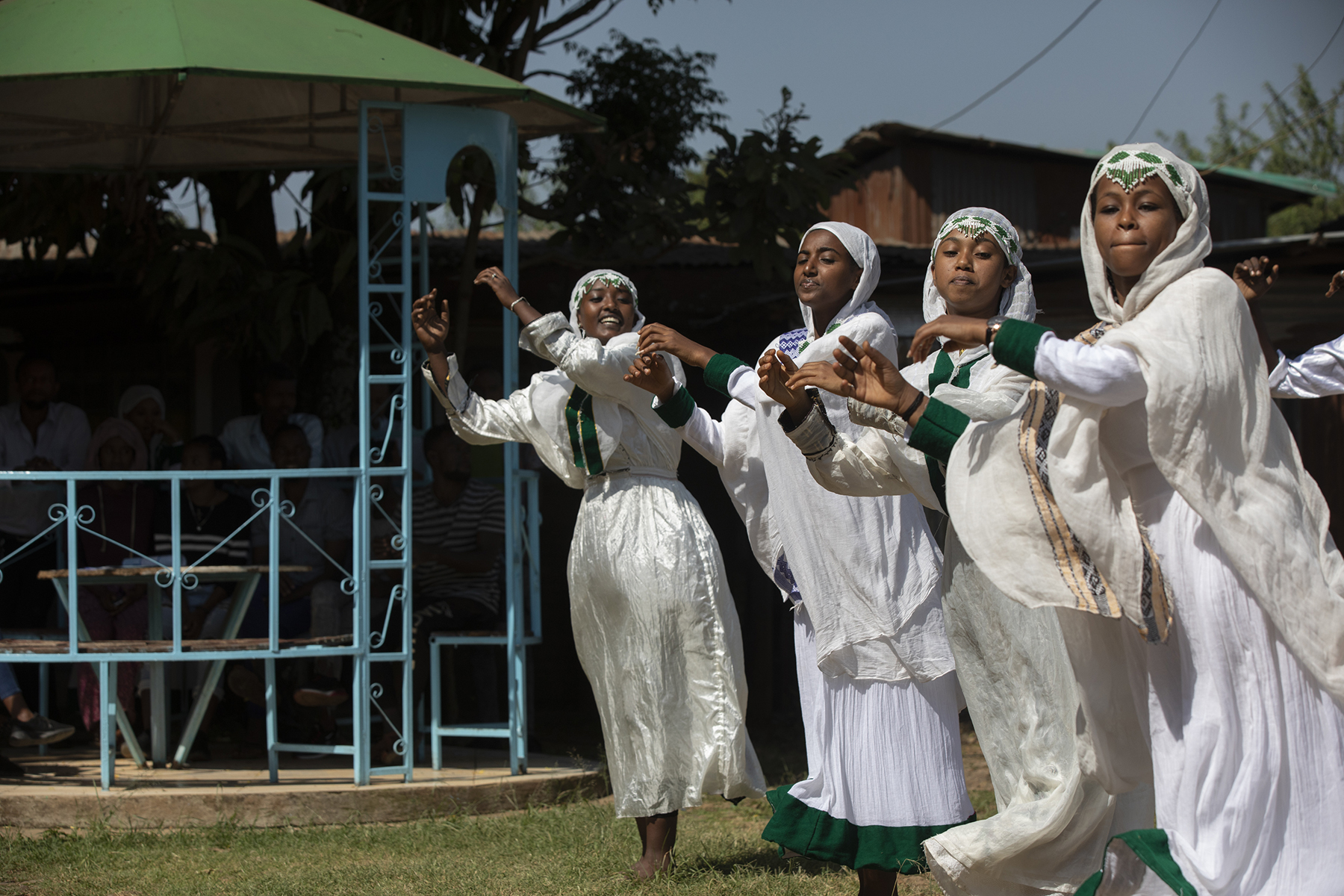
Youth-led sexual healthcare through dance, song, and poetry
In Ethiopia, getting young people’s attention about sexual and reproductive healthcare is no easy task. But at a youth centre in Jimma, the capital Oromia region, groups of young people are getting vital messages about sexual health and contraception out to their peers through dance, song, and poetry. Student Jumeya Mohammed Amin came here to train as a peer educator for sexual and reproductive health [SRH] three years ago, when she was 14 years old. In her community – a conservative village 20 km outside the city – early marriage and pregnancy was common, and information about SRH practically unheard of. Navigating traditional norms “Girls younger than me at the time were married. The youngest was only nine,” said Amin, who would watch her classmates have to leave their home, school, and playmates behind. In Amin’s community, to opt out of unintended pregnancies involves unsafe abortion methods such as remedies prescribed by traditional healers – which can be fatal. “I know one girl from 10th grade who was 15 years old, and she died from this in 2017,” she said. But Amin’s work educating hundreds of young people each year on sexual health has changed attitudes in her community around early marriage, unplanned pregnancy and the options available to prevent it, she says, with many of her peers now waiting to start becoming sexually active. Tackling high rates of teen pregnancy Oromia has the third highest rate of teenage pregnancy in Ethiopia, after the Afar and Somali regions, says Dessalegn Workineh, who runs the Jimma office of the Family Guidance Association of Ethiopia [FGAE], which is supported by IPPF. “In Oromia, out of this rate of teen pregnancies, almost twenty percent end up in abortion,” he said. The region also has the third lowest uptake of contraceptives among women aged 15 to 49. 17-year-old peer educator Mastewal Ephrem says that the problem comes down to a lack of information. “People don’t know about reproductive health and they need this information about how to manage their family, sex and infections,” she said. Religious and social conservatism make this difficult, especially in poor and rural areas where families receive dowries in the form of money and gifts when their daughters marry. “Because of not having confidence and not talking to people, girls are doing early marriage,” said Ephrem. Poverty and other hardships also push girls out of their family homes early and leave them in precarious situations, where they run a high risk of encountering abuse. “I see girls aged 10, 13 and 15, who live on the streets and take drugs,” said Emebet Bekele, a counsellor working at an IPPF-supported clinic in Jimma that is aimed at helping sex workers. Bekele provides counselling and testing for HIV and STIs. She talks to girls and women about the full range of free and confidential family planning services available at the clinic. “Sometimes we bring them from the streets and we test them. Most of them get pregnant,” she said. She often supports students to get safe abortion care; including girls as young as 13. Taking sexual healthcare to the streets The youth centre reaches a lot of young people in schools and directs them towards the youth centre, where there is a library and many group activities and performances to teach them about SRH. Groups of young people practice and perform short plays and dances about topics such as unsafe sex and STIs here, as well as on the streets, where they draw a crowd. Fourteen-year-old Simret Abiyu has turned what she has learned into SRH-themed poems that she pens and performs to her peers in English, Amharic and Oromo. “Sometimes I get training here and write poems about family planning and the work of FGAE and the development of the country,” she said. Healthcare and advice via the phone University student Nebiyu Ephirem, 26, is a youth leader at the centre. He has been managing the two SRH helplines – located in a quiet back office – since it started in 2017. He answers a lot of calls from young people asking about contraception or their bodies and people dealing with emergencies and tries to answer their questions or refer them to public, private or FGAE clinics across the country. “Culturally, people used not to want to discuss sexual issues. They fear discussing these openly with family, and due to religious beliefs, so people like to call me,” said Ephirem. The youth centre reaches more than 11,000 young people a year through its work at schools, and through outreach clinics located in coffee plantations, where many young people work. Currently, the youth centre uses the helpline, radio adverts and social media to inform people about sexual health. The team hopes that media campaigns can spread the message wider in order to raise awareness about young peoples’ sexual health needs.
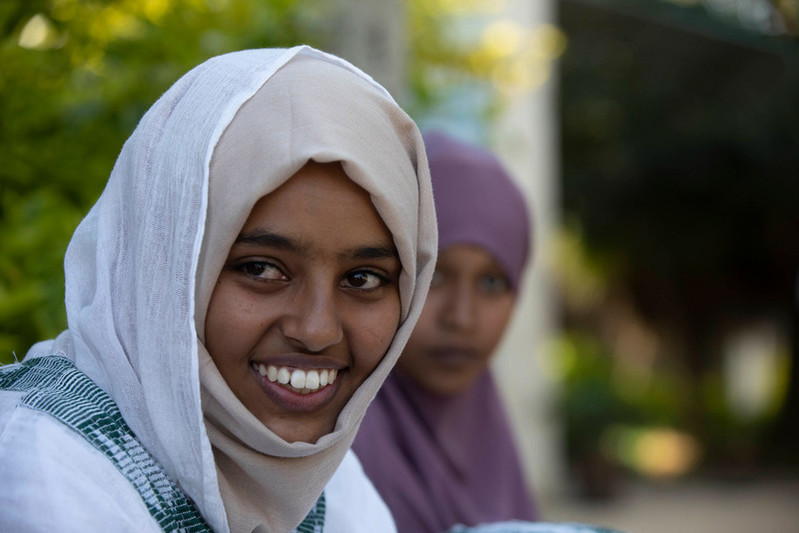
"I wanted to protect girls from violence – like early marriage – and I wanted to change people’s wrong perceptions about sex and sexuality"
Seventeen-year-old student Jumeya Mohammed Amin started educating other people about sexual and reproductive health when she was 14 years old. She trained as a ‘change agent’ for her community through the Family Guidance Association of Ethiopia’s south west office in Jimma, the capital of Oromia region. Amin comes from a small, conservative town about 20km outside the city. "I wanted to protect girls from violence – like early marriage – and I wanted to change people’s wrong perceptions about sex and sexuality, because they [men in her community] start having sex with girls at a young age, even with girls as young as nine years old, because of a lack of education." "They suddenly had to act like grown-up women" "Before I started this training I saw the majority of students having sex early and getting pregnant because of a lack of information, and they would have to leave home and school. Boys would be disciplined and if they were seen doing things on campus, expelled. Girls younger than me at the time were married. The youngest was only nine. They would have to go back home and could not play anymore or go to school. They suddenly had to act like grown-up women, like old ladies. They never go back to school after marriage. My teacher chose me for this training and told me about the programme. I like the truth so I was not afraid. I heard about a lot of problems out there during my training and I told myself I had to be strong and go and fight this." "I have a brother and four sisters and I practiced my training on my family first. They were so shocked by what I was saying they were silent. Even on the second day, they said nothing. On the third day, I told them I was going to teach people in schools this, so I asked them why they had stayed silent. They told me that because of cultural and religious issues, people would not accept these ideas and stories, but they gave me permission to go and do it. Because of my efforts, people in my school have not started having sex early and the girls get free sanitary pads through the clubs so they no longer need to stay home during periods." Training hundreds of her peers "I know people in my community who have unplanned pregnancies consult traditional healers [for abortions] and take drugs and they suffer. I know one girl from 10th grade who was 15 years old and died from this in 2017. The healers sometimes use tree leaves in their concoctions. We tell them where they can go and get different [safe abortion] services. The first round of trainings I did was with 400 students over four months and eight sessions in 2017. Last year, I trained 600 people and this year in the first trimester of school I trained 400. When students finish the course, they want to do it again, and when we forget we have a session, they come and remind me. At school, they call me a teacher. I’d like to be a doctor and this training has really made me want to do that more."
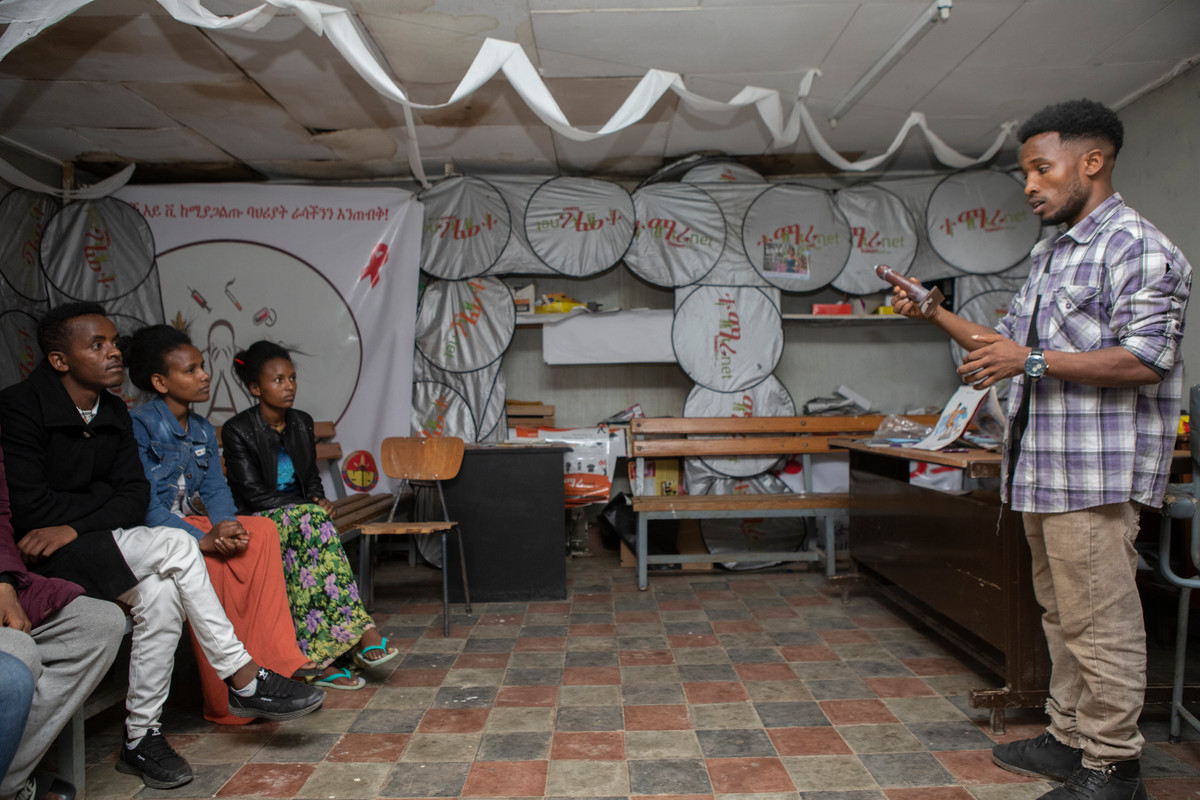
Ethiopia: Filling the sexual health gaps for young people through a unique youth center
Every Saturday, about 40 people gather at a youth center in Mekelle to hear about a subject they don’t get taught in schools in Ethiopia, and don’t want to discuss with their parents – sexual and reproductive health (SRH). This youth center located in the Tigray region of northern Ethiopia, is run by the Family Guidance Association of Ethiopia (FGAE) – it has a playground and library at the front for studying and socializing. In the back, there is a clinic and offices where staff provide a full range of SRH services, including free contraceptives, abortion care and testing and counselling for sexually transmitted diseases (STIs). “In our country, we have a huge amount of youth and adolescents and it is very important to work with them on sexual and reproductive health,” said Mebrahtu Abadi, who manages this center in Mekelle, the capital of Ethiopia’s Tigray region. Young people at the heart of the center Ethiopia has Africa’s second largest population and according to government studies, youth makes up roughly a third of its population. The center is aimed at people aged between 10 and 24 years old and runs a range of activities, including holding sessions in schools to bring people in for talks and services. On Saturdays, groups of young people usually do some performance art based on a particular SRH subject, and hold debates and discussions around a coffee ceremony – a traditional Ethiopian social gathering. “In these ceremonies we prepare a poem or a short drama to entertain and educate using peer to peer methods about things like HIV and other sexually transmitted diseases, contraceptives, unplanned pregnancy and abortion”, said Abadi. The youth center has 20 peer educators – 10 male and 10 female – who provide counselling to others at the center, in schools and communities. Tigray is home to about five million people and Mekelle is a large university town, so the centre also works with campus clinics and with university and school clubs focusing on sexual health education. Peer educators leading the change There is always some giggling when the group’s leader, 24-year-old engineering student Tsegay Teklehaimanot, shows how to use male and female condoms. “They laugh and they love it,” he said. The club has more than a thousand members and the work the peer educators do is voluntary, but rewarding. “I’m proud of doing that thing because I am educating my friends and my family and protecting them,” says Teklehaimanot. Biology student Gebre Haileselassie says that young people will discuss things with their peers that they would be embarrassed to ask their parents. “In this place, we talk easily and are happy to talk,” he said. “The main message and point is how to protect ourselves, because in our world now, there are a lot of diseases and infections,” he said. The peer educators often stress the risks involved with drinking and having unprotected sex, especially with strangers. “There are so many students that don’t know how to use condoms and [what to do] if something happens,” said Teklehaimanot. Unintended pregnancies often mean female students drop out of school, and most are not aware of other options, so the peer educators provide information and refer them to counselling services. Unsafe abortion numbers drop Baraki has been working at the main FGAE clinic in Mekelle for 21 years and seen the number of unsafe abortions performed by traditional healers drop in recent years, and the number of young people coming in for comprehensive abortion care rise. “Especially in high schools and universities it has increased,” she said. “Nowadays awareness is increasing, especially in post-abortion complications and use of contraceptives,” she said. Complications arise due to traditional healers inserting sharp, unsterile instruments into the uterus or prescribing a concoction of antibiotics, toxic tree leaves and strenuous exercise. In rural villages however, Baraki has seen the number of safe abortion decrease “due to some changing norms”, she says, although outreach services have also dropped due to budget cuts. Contraceptive shortages in rural areas Programs to help youth in rural areas have been scaled back in recent years due to a decrease in funding for SRH services from international donors and the government of Ethiopia. Mekelle had to cut its monthly visits to twelve rural districts in Tigray to once a quarter, then completely, and other partners have also stopped doing outreach in rural areas. “Nowadays they are not there and these services that are given by them are not supported now,” said Abadi. The cuts also mean that in Tigray, there are shortages of condoms and HIV testing kits, including at the youth center. Thanks to an FGAE program to provide free SRH services and products through public and private clinics, many young people and the poor from rural areas that come to Mekelle to sell produce now go to a 24-hour private clinic located in downtown Mekelle. Clinic owner Temegen Weldegiorgis says that many students come to get contraceptives, STI testing and comprehensive abortion care here because they can’t afford to pay for services, but fear being seen by family members at public clinics. The clinic serves a lot of teenagers who know nothing about family planning and the risk of STIs, and other underserved or unreached groups that need a drop in service in the center of town, such as farmers, sex workers, people living with a disability and veterans. “They need privacy and so come and have the service here,” he said.
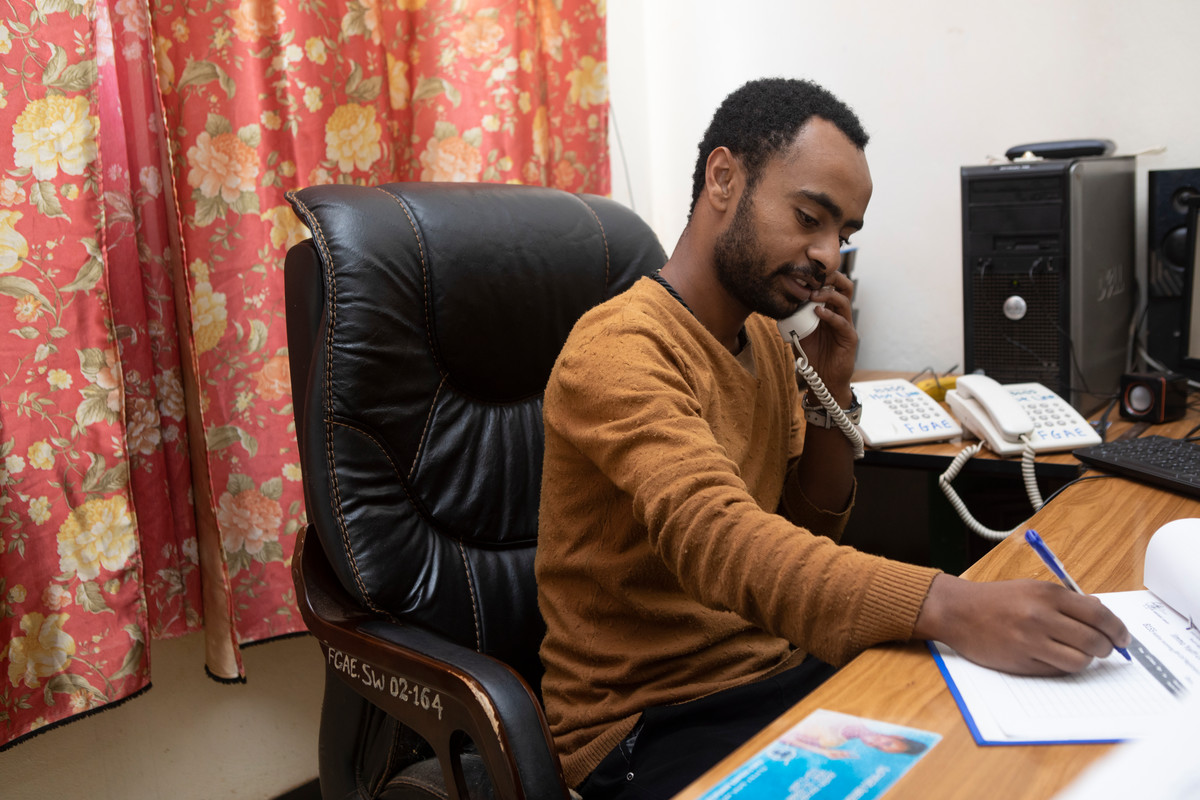
"I'm a volunteer here, so it’s mental satisfaction I get from doing this"
Youth leader Nebiyu Ephirem, 26, has been staffing the phones at a hotline for young people who have questions about sexual and reproductive health (SRH) since it started in 2017 in Ethiopia’s Oromia region. The helpline has two phones and is free, anonymous and open six days a week. The helpline is aimed at people aged 17-26 who are curious about SRH but are too shy or afraid to ask others about topics such as contraception, menstruation, and diseases. The hotline also advises people dealing with emergencies following unprotected sex and issues such as unintended pregnancy and concerns over sexually transmitted infections (STIs), by referring people to their nearest clinic. About 65 to 70 percent of the callers are female. Ephirem also trains other people about SRH and how to educate more young people about this. Being on call for his community “Most days, I get about 30 to 40 calls and on a Saturday, around 50. People ask about contraceptive methods like pills and emergency contraceptives and depo provera [three-month injectable contraceptive], about the spread of STIs and HIV and how to prevent it, and about menstruation and sanitation. I give my suggestions and then they come and use Family Guidance Association of Ethiopia (FGAE) services, or I refer people to clinics all over the country. There are seven FGAE clinics in this area and dozens of private clinics. Young people need information about STIs before they come to the clinic, and when they want a service they can know where the clinics are. Most of them need information about menstruation and contraception. They fear discussing this openly with family and due to religious beliefs, so people like to call me. Culturally, people used to not want to discuss sexual issues. We took the information from IPPF documents and translated them into the two local languages of Oromia and Amharic, with the help of university lecturers. After four years, even the religious leaders did this training. We have trained university students, teachers and many more people to be trainers and 30 of them graduated. They [the people who dropped out] did not want to hear about the names in the local language of body parts. Most of the ones who stayed were boys and girls, but now we have women doing this. [At first], they were laughing and said: ‘How could you talk like this? It’s shameful. But slowly, they became aware. They now talk to me, they discuss things with their parents, families, even teachers at school and friends.” Lack of sex education There is no sex education in Ethiopia’s national curriculum but youth groups and activists like Ephirem and his colleagues go into schools and teach people through school clubs. “This year [2019] up to June we trained 16,000 people and reached 517,725 adolescents and young people aged 10 to 24 through the helpline, social media – Facebook, Twitter and YouTube – workshops, radio talk shows and libraries.” A banner in Jimma town promotes the helpline and its number 8155, as does Jimma FM radio. “The target for reaching people in school was 5,400. We achieved 11,658. The most effective way to reach people is at school. At the coffee plantation sites we reach a lot of people.” The minimum family size around here is about five and the maximum we see is 10 to 12. In our culture, children are [considered as a sign of] wealth and people think they are blessed [if they have many]. When we go to schools to teach them, there are kids that already have kids. But after we teach them, they generally want to finish education and have kids at 20-25-years-old. We tell people they have to have kids related to the economy and to their incomes and we calculate the costs to feed and educate them. I’m a volunteer here, so it’s mental satisfaction I get from doing this. I get 1000 Ethiopian Birr [roughly USD 30] per month for transport costs. I am also studying marketing at university and want to become a business consultant.”
Pagination
- Page 1
- Next page







